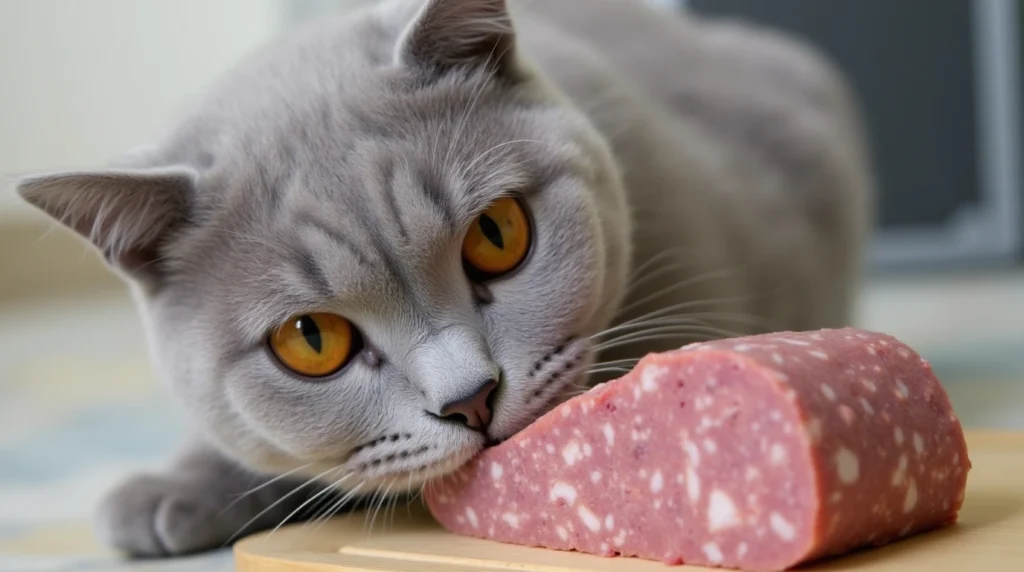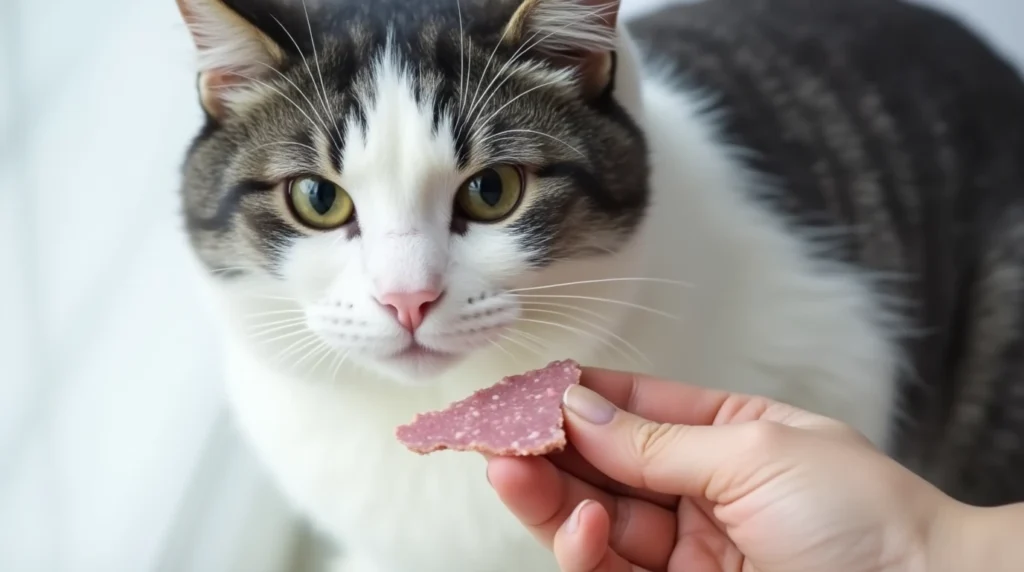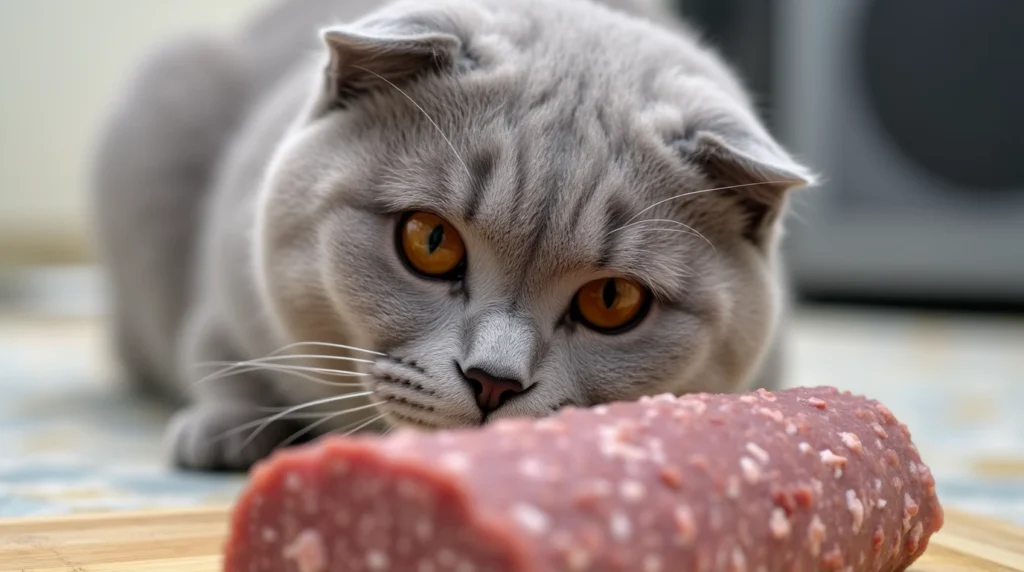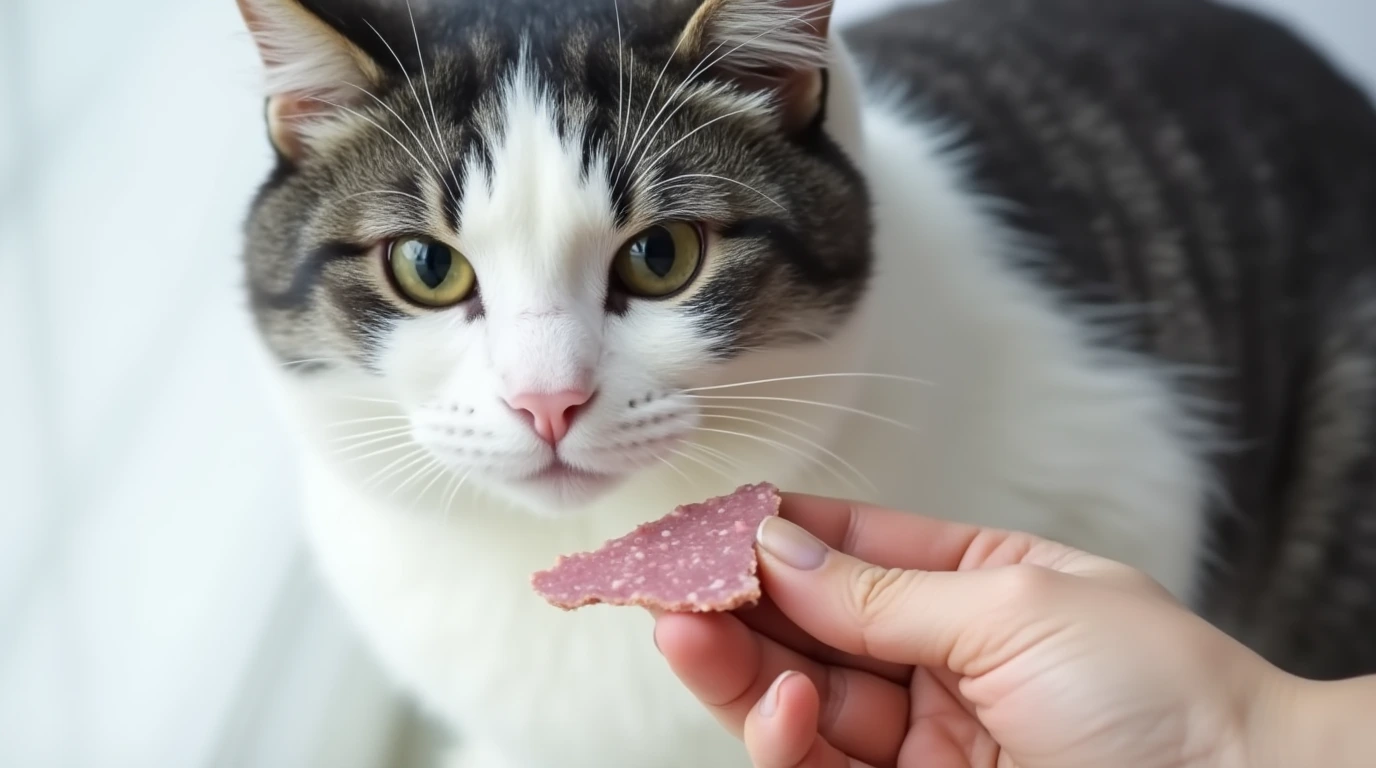If you’re a cat owner who loves to enjoy a savory slice of salami, you may have wondered whether it’s safe to share a bite with your feline friend. While it’s tempting to offer your cat a taste of your food, not all human treats are suitable for your furry companion. In this guide, we will explore whether salami is safe for cats to eat, the potential risks, and what alternatives might be better for your pet’s health.
Whether you’re a new cat owner or someone who’s been living with cats for years, understanding what foods are safe for your pet is essential for their long-term health. Let’s dive into the question: Can cats eat salami?
Table of Contents
What is Salami? Understanding the Ingredients
What Is Salami Made Of?
While salami can be a delicious snack for humans, its ingredients might not always align with the dietary needs of your cat.
- Key Ingredients: Pork or beef, salt, garlic, fat, pepper, wine or vinegar
- How It’s Made: Fermentation and drying for preservation and flavor
Now that you know what salami is, let’s explore whether it’s safe for your cat to consume.

Can Cats Eat Salami?
The Short Answer: Yes, But With Caution
Technically, cats can eat salami in small amounts without immediate harm. However, salami is not a food that should be included in your cat’s regular diet. It’s important to understand the risks that come with feeding your cat foods intended for human consumption.
Let’s take a deeper look into the potential issues surrounding salami and its suitability for your cat.
The Risks of Feeding Salami to Cats– Can Cats Eat Salami
Excessive Salt: A Major Concern
Salami is loaded with salt, which serves as both a preservative and a flavor enhancer. For cats, however, too much salt can be harmful. High salt content can lead to dehydration, kidney damage, and even salt poisoning in extreme cases.
Fat Content: A Health Hazard
Salami is also high in fat. While cats need fat in their diet, excessive fat can lead to obesity, pancreatitis, or other digestive issues. A high-fat diet can also cause your cat to gain weight, which may contribute to more serious health problems in the future, such as diabetes or heart disease.
Toxic Ingredients: Garlic and Onion
Garlic and onion are sometimes included in the seasoning mix for salami, and both of these ingredients are toxic to cats. Even in small amounts, garlic and onion can damage a cat’s red blood cells, leading to anemia. In severe cases, garlic and onion poisoning can cause lethargy, vomiting, diarrhea, and even organ failure.
Additives and Preservatives
Commercial salami often contains preservatives and artificial additives, which are not suitable for a cat’s digestive system. Cats are much more sensitive to chemical additives than humans, and these substances can contribute to health problems over time.
What Could Happen if Your Cat Eats Salami?

Dehydration and Kidney Damage
Excessive salt in salami can cause dehydration, which is a particular concern for cats since they don’t always drink enough water. Dehydration can stress the kidneys, and if left untreated, it can lead to kidney disease. Cats are at a higher risk of kidney problems as they age, so it’s crucial to avoid salty foods like salami.
Weight Gain and Obesity
Due to its high fat content, salami can contribute to weight gain. Obesity is a common issue among domestic cats, and it can lead to diabetes, joint issues, and reduced life expectancy. A single slice of salami can have more fat and calories than your cat needs, making it a poor choice for a treat.
Pancreatitis
Pancreatitis is the inflammation of the pancreas, which can occur when a cat consumes fatty foods like salami. Pancreatitis can be extremely painful for your cat and might require veterinary intervention. Symptoms include vomiting, diarrhea, abdominal pain, and lethargy.
Toxicity from Garlic and Onion
If the salami contains garlic or onion, there is a risk of poisoning. Garlic and onion contain compounds that break down red blood cells in cats, causing hemolytic anemia. Even a small amount of these ingredients can be dangerous, and repeated exposure could have a cumulative toxic effect.
What to Do If Your Cat Eats Salami
Monitor for Symptoms
If your cat manages to sneak a piece of salami, it’s important to monitor them for any signs of illness. Look out for symptoms like vomiting, diarrhea, lethargy, or excessive thirst. If any of these signs appear, it’s crucial to contact your vet immediately.
Hydration Is Key
Ensure your cat has access to fresh water, especially if they’ve consumed a salty food like salami. Keeping your cat hydrated can help mitigate the effects of dehydration and support kidney function.
Seek Veterinary Care if Needed
If your cat consumes a large amount of salami or seems to show serious symptoms of illness, don’t hesitate to contact your veterinarian. They may suggest immediate treatment or a visit to ensure your cat’s safety.
Alternatives to Salami for Cats
Healthy Cat Treats-Can Cats Eat Salami?
If you’re looking to reward your cat, there are healthier alternatives to salami that are both safe and nutritious. Here are some options:
- Lean Meats: Cooked chicken, turkey, or lean beef are excellent alternatives. These meats are high in protein and are much healthier for your cat than fatty or processed meats like salami.
- Cat-Specific Treats: Many pet stores offer treats that are specially formulated to meet your cat’s dietary needs. These treats come in a variety of flavors and textures, ensuring your cat stays entertained while getting the nutrients they need.
- Fish: Small amounts of cooked tuna or salmon can be a tasty and safe treat for your cat. However, avoid offering raw fish or fish that has been seasoned with oils or spices.
- Catnip and Cat Grass: These natural treats are safe and enjoyable for most cats, promoting relaxation and digestion.
Homemade Cat Treats-Can Cats Eat Salami?
You can also make homemade treats for your cat using healthy ingredients. There are plenty of recipes online for simple cat treats made from tuna, chicken, or even pumpkin. These options allow you to control the ingredients and ensure your cat is getting a safe, healthy snack.
Nutritional Needs of Cats-Can Cats Eat Salami?
What Should Cats Eat?
Cats are obligate carnivores, which means they require a diet rich in animal-based proteins and fats to thrive. While they can eat some plant-based foods, their bodies are designed to process meat. When selecting food for your cat, be sure to choose high-quality commercial cat food that meets their nutritional needs.
What’s in a Balanced Cat Diet?– Can Cats Eat Salami.
- Protein: The primary nutrient your cat needs is protein. Look for foods that list real meat as the first ingredient, like chicken, turkey, or beef.
- Fat: Fat provides energy and supports your cat’s skin and coat health. Make sure the fat content is balanced and not excessive.
- Vitamins and Minerals: Cats require specific vitamins and minerals, such as taurine, which is essential for heart and eye health.
- Water: Cats are prone to urinary tract problems, so providing access to fresh water at all times is crucial.

Conclusion: Should You Feed Your Cat Salami?-Can Cats Eat Salami
In conclusion, while salami isn’t toxic to cats, it’s far from an ideal food choice. Its high salt, fat, and potential toxic ingredients make it unsuitable for your cat’s diet. If you want to treat your cat, stick to healthy, species-appropriate alternatives like lean meats, fish, or specially formulated cat treats. These options will help keep your cat healthy, happy, and well-nourished.
Call to Action-Can Cats Eat Salami
Do you want to learn more about keeping your cat healthy and happy? Visit Meow Realm for expert advice, tips, and resources on everything related to cat care. Don’t forget to share this article with fellow cat lovers to ensure their pets stay safe and well-fed!

